Nearly 30 years have elapsed since the last overhaul of the U.S. tax code.
Never in that time has the need for reform been so urgent, in the eyes of businesses and lawmakers, and yet the prospect of legislative success depends on countless contingencies falling into place and daunting political obstacles being overcome.
While Republicans increasingly favor big and bold supply-side tax cuts, Democrats have been moving in the other direction.
And at the same time that U.S. businesses have been seeking ways to move their headquarters out of the U.S., pushed toward the exits by the broken tax code, they have been held hostage to fears that reforms advertised as a fix for business might turn into tax cuts for the wealthy.
The resolution, if and when it happens, may start in the Republican primary.
Republicans go bold
“We will abolish the IRS,” Ted Cruz regularly promises on the stump, promoting an idea that generates plenty of populist support, especially now as Americans trudge through their annual tax returns.
Cruz’s plans are radical. If the Texas senator had his way, workers would face one 10 percent tax rate. His “business flat tax” would send the U.S. corporate tax rate down from 35 percent, the highest such rate among developed nations, to 16 percent, one of the lowest.
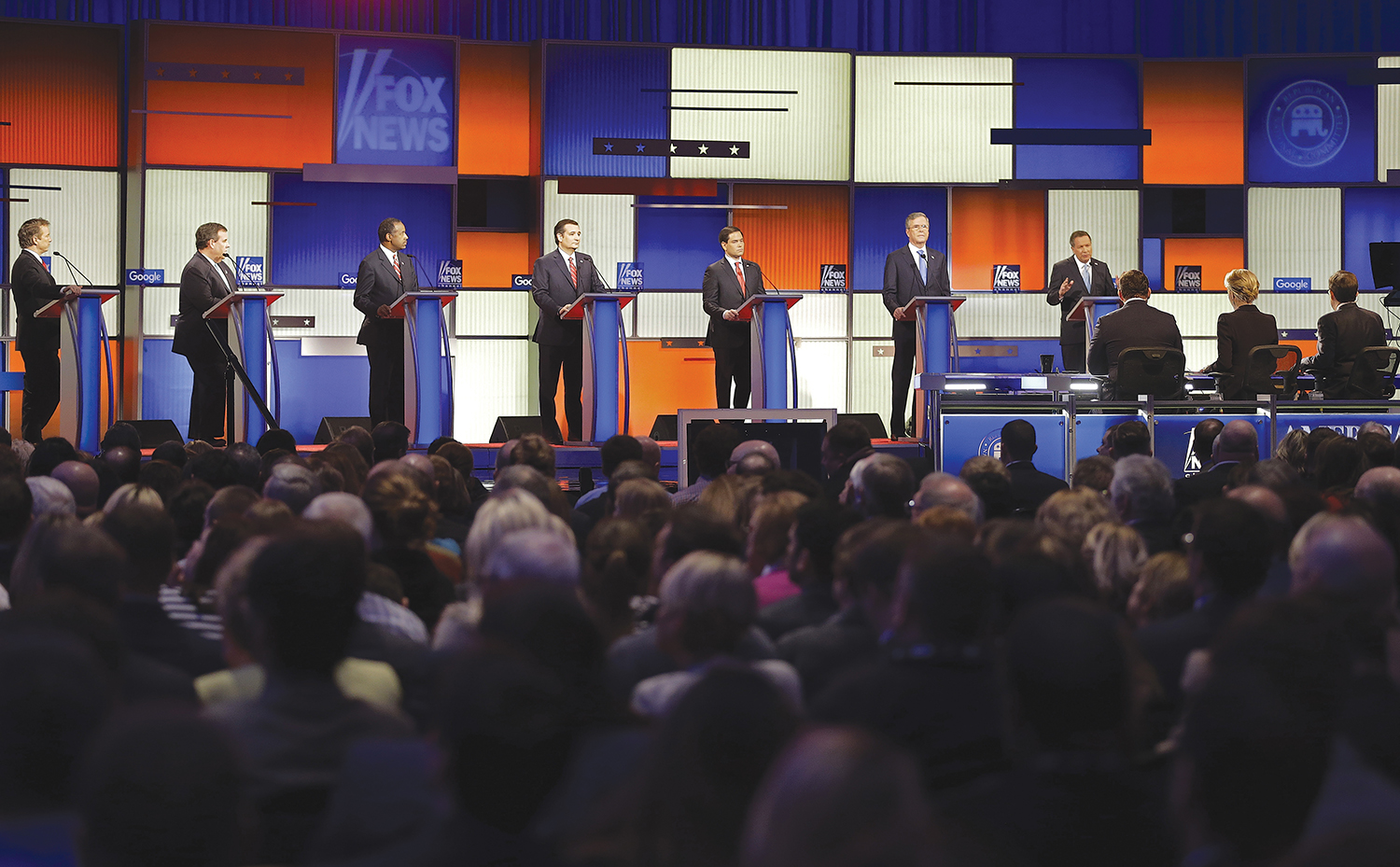
Early in the GOP primary, Sens. Ted Cruz, Marco Rubio, Rand Paul and others traded barbs over whose tax plan was better. (AP photo)
It’s not new, of course, for a Republican to want lower tax rates. What is new is what’s going on behind the rate reduction, which is a sign of how much and how quickly GOP tax goals have changed.
Corporations are taxed on their profits. That wouldn’t be the case under Cruz’s plan. The “tax base,” as it is called by economists, would be consumption, not income. What that means is that the burden of the tax falls on consumers of the company’s goods, rather than the owners of the company.
Here’s how it works: As goods go from raw material to final sale to consumers, businesses are taxed on the value they add at each stage of production.
When the retailer sells to the consumers, it passes on those taxes to them, in the form of higher prices.
Such a tax is called a value-added tax, of the kind that is common in most other developed nations, but not in the U.S.
Cruz’s version of it, which is more complicated than the one above, is a particularly bold version of some of the newest and most innovative ideas that have been circulating among Republicans.
Economists believe that consumption-based taxes are more efficient and more conducive to economic growth than taxes on income or on savings. They collect revenue for government services without penalizing investment and, accordingly, business expansion.
Consumption-based tax reforms have been popular on the presidential campaign trail, where Cruz’s fallen rivals and Senate colleagues Rand Paul and Marco Rubio proposed overhauls that would have moved the U.S. toward a consumption tax base.
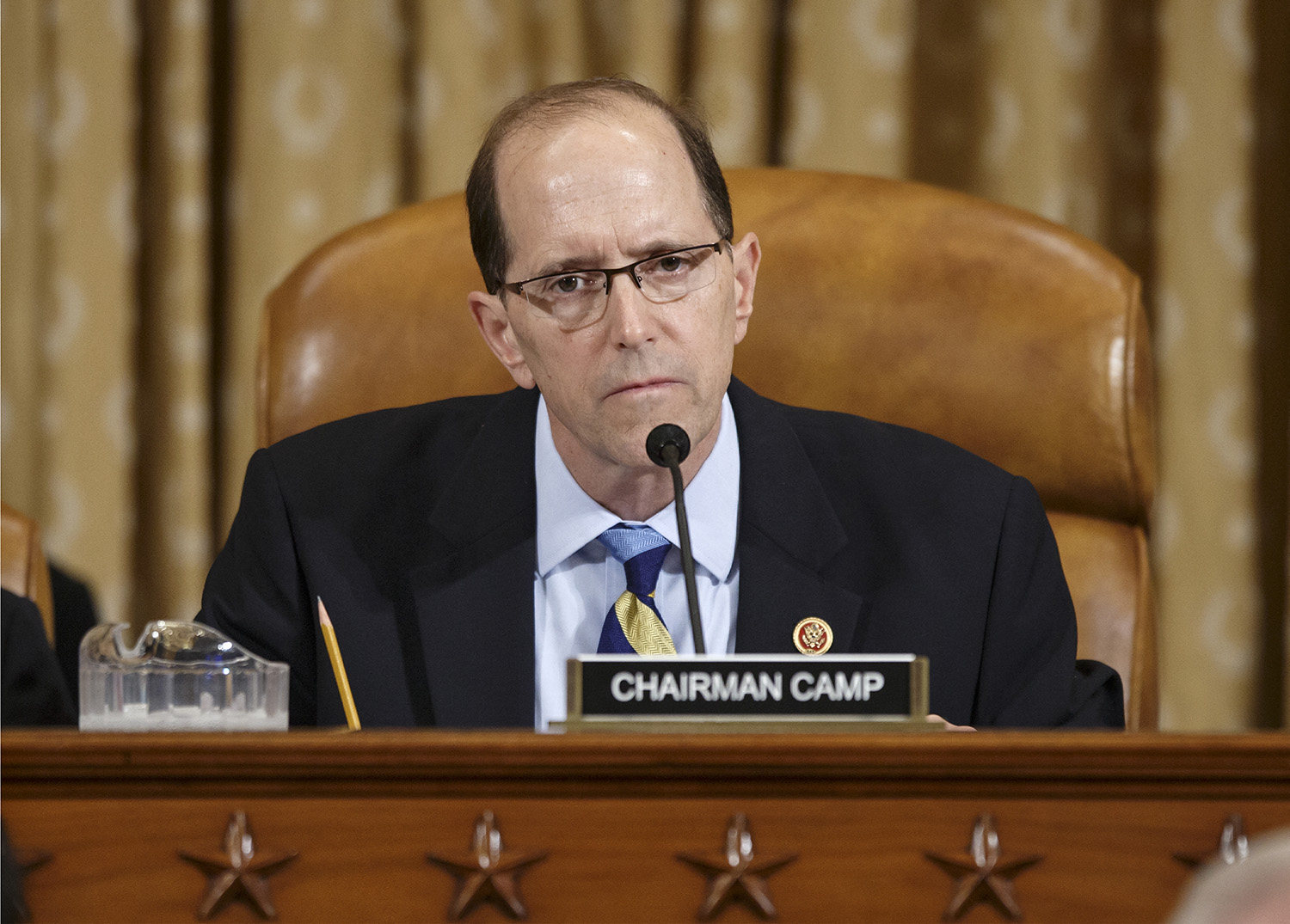
To lower the tax rate to 25 percent without losing revenue, Rep. Dave Camp, R-Mich., raised money by requiring companies to write off investments on a longer timeline. (AP Photo)
The ideas have found purchase on Capitol Hill. In March, the House Ways and Means Committee, the committee with jurisdiction over tax legislation, examined one new bill in particular, from senior Republican Rep. Devin Nunes of California, that would be nearly as aggressive as Cruz’s reform.
In economist speak, Nunes’ bill would tax businesses on cash flow, rather than profit. Under the current code, all kinds of complicated rules are needed to estimate how much income a business earns in a given year. Businesses have to guess at the value and timing of earnings on capital assets, while also subtracting capital expenses such as outlays on machinery according to a government schedule.
The complex system invites gamesmanship and creates confusion. The cash-flow approach, on the other hand, would be closer to just taxing money in minus money out each year.
Part of that would be allowing businesses to immediately write off spending on machines, buildings and other investments. That has one big advantage: In the models used by economists to gauge the effects of changes in tax law, that tends to generate a lot of economic growth.
“The economists who make the models adore” policies that allow companies to immediately write off investments, said Jon Traub, managing principal of tax policy for Deloitte Tax LLP.
That’s important because faster economic growth means more jobs and income, and correspondingly higher tax revenue, in the “dynamic” tax analyses that Republicans have implemented for Congress’ official tax scorekeepers.
Higher revenue, in turn, eases the politics of tax reform: The extra cash allows Congress, without adding to the deficit on paper, to lower tax rates without angering more constituents by cutting their pet tax breaks.
That was one of the problems that stalked the tax reform draft published in 2014 by former Ways and Means Chairman Dave Camp of Michigan, the product of years of work.
To lower the rate to 25 percent without losing revenue, Camp raised money by requiring companies to write off investments on a longer timeline, not shorter.
The result was that the macroeconomic models showed Camp’s plan generating less growth than reform advocates might have hoped for. He had to cut so many business tax breaks and loopholes that the plan was effectively dead on arrival. It had negligible support outside Congress or within it.
Since then, Republicans have moved in the opposite direction, away from taxing investment as much as possible.
In doing so, however, they have created a new political headache for themselves.
If you allow companies to write off investments as they’re made, you must also limit their ability to deduct the cost of interest they pay on loans. Otherwise companies would, on net, receive a subsidy from the Treasury for buying a new piece of equipment or a new office.
Nunes would end the deductibility of interest payments for nonfinancial firms. Cruz’s plan likely would do the same, although the campaign did not provide a direct answer. Donald Trump, the Republican front-runner, would put a “reasonable cap” on such deductions, even though he did not call for shorter depreciation schedules.
But that won’t sit well with businesses, most of whom view interest expense as just another cost of doing business. The March House hearing on consumption tax possibilities was enough to elicit pushback from a business group specifically set up to defend the deductibility of interest payments.
Part of the defensiveness, Traub explained, is that they would be trading a previously permanent tax break for a tax cut of unknown stability. “Tax VPs, corporate officials tend to not like that,” he said.
Policy-free zone
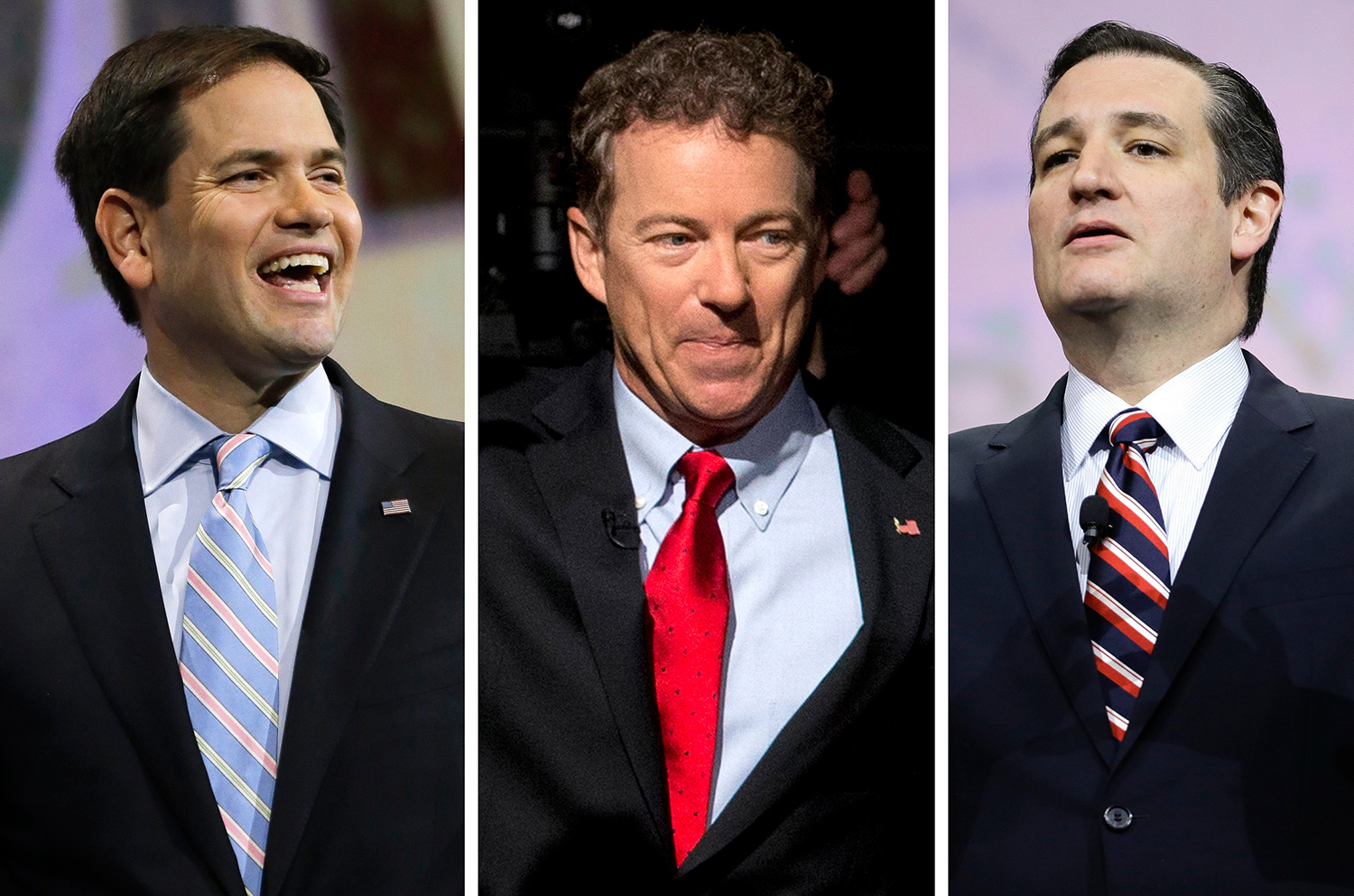
Earlier in the contest, Rubio, Paul, Cruz and others traded barbs over whose tax plan was better. (AP photo)
Such bold ideas, however, won’t happen immediately. The Republican presidential candidates are locked in a primary struggle that is light on debates about tax policy, or any policy at all.
The GOP race wasn’t always that way. Earlier in the contest, Cruz, Rubio, Paul and others traded barbs over whose tax plan was better. Detailed policy arguments, especially a long-running conservative debate over whether Cruz’s VAT would lead to bigger government because it raises money so efficiently, have cooled off as the primary fight has become more personal and personality-based.
As a result, the substantive work that began under Camp, who retired, and has continued under current Ways and Means Chairman Kevin Brady and House Speaker Paul Ryan, could be at the mercy of a Republican president who has not been significantly tested at this point of the campaign.
In particular, Trump is more of an unknown than past candidates. Although reform may not be among his priorities, his tax plan is right down the middle of Republican orthodoxy on taxes, if particularly budget-busting.
“Trump would come in with a lot of skepticism from … mainstream Republicans,” said Tevi Troy, who was director of domestic policy for Mitt Romney’s presidential transition team in 2012. “If he were to get something like [tax reform] done, I think this would be the kind of feather in his hat that he would look to and say: ‘Look, I got this done, we’ve been talking about this for 30 years.'”
It’s still too early for direct conversations between congressional Republicans and the candidates. Those discussions, when they happen, would take place between a White House staff, the congressional leadership and the tax-writing committees.
Once the parties have nominees, however, the discussions will begin in earnest. Any differences in tax policy in one party need to reach compromise early, said Troy, who is now president of the American Health Policy Institute. Tax reform is a major undertaking that needs to be done in the first 100 days, Troy said. “You need to get out of the block early on this kind of thing.”
United lawmakers?
The biggest intra-party negotiations will be mainly over three broad perimeters: whether the legislation should add to the deficit, how much to lower rates and which tax breaks are liable to be eliminated.
On the first question, a gulf already exists between the Republican presidential candidates and their congressional counterparts.
Brady, one of Congress’ most dedicated proponents of tax reform, said in February that his goal was for tax reform not to add to the deficit on a dynamic basis — that is, allowing for the added revenue that would come with faster economic growth.
The Republican presidential candidates’ plans are not close to that mark. Cruz’s plan would lose $768 billion in revenue over 10 years, nearly as large an amount as Obama’s stimulus bill when it was announced, according to a dynamic analysis by the Tax Foundation, a Washington think tank. The same group found that Trump’s reform, meanwhile, would lose more than $10 trillion. The president and Congress would have to find common ground.
Cruz or Trump likely would come into conflict with lawmakers over which credits, deductions and other preferences remained in the tax code. Cruz would do away with nearly all deductions, except for the prized deductions for mortgage interest and charitable contributions. Such far-reaching benefit cuts would surely meet resistance from members of Congress, who represent diverse populations and industries.
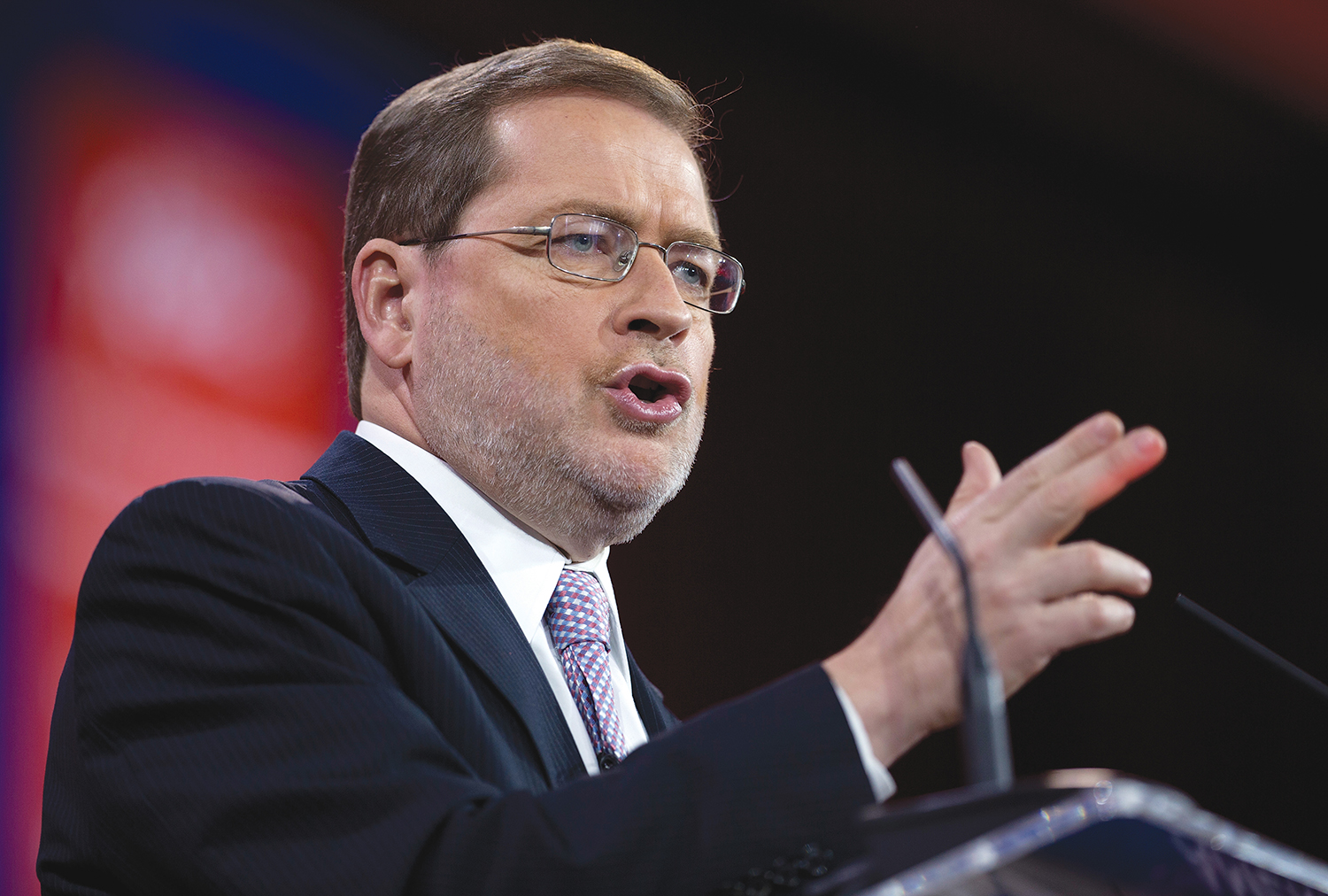
“The only thing between us and fundamental tax reform is a Republican president,” said Grover Norquist, the longtime conservative activist. (AP photo)
Nevertheless, some see those big questions as ones that a unified Republican government could quickly answer.
“The only thing between us and fundamental tax reform is a Republican president,” said Grover Norquist, the longtime conservative activist who has advocated for tax reform for years as the head of the Washington group Americans for Tax Reform.
And the president’s campaign ideas will take a backseat to those Congress has been working on. “Guys running for president are always trying to hit a home run and do something unique and different,” Norquist said. “It’s not going to be unique and different.”
Congressional Republicans would have done a lot of the work that would go into an undertaking of the magnitude of a tax reform, starting with the Camp draft, the bills introduced at the Ways and Means Committee and the tax reform plan that Ryan has requested ahead of the November elections, along with countless think tank papers and academic articles.
Not much coordination would be needed between the White House and the committees once the time comes, said former Oregon Sen. Bob Packwood, the Republican head of the Finance Committee who co-wrote the 1986 tax reform.
“Congress can move quickly when it’s ready to move,” Packwood said. In 1986, he and the bipartisan group of senators he worked with put the reform package together over seven days, he said, starting each morning at 8:30.
On the most pressing issues, anyway, there is consensus among Republicans, and even some Democrats.
One of those is bringing the U.S. corporate tax rate into line with those of European nations.
Slashing the corporate tax rate is the top priority, said Chris Edwards, the director of tax policy studies at the libertarian Cato Institute.
Edwards was one of the first tax experts to recommend the idea of a cash-flow tax base, and has briefed Nunes’ staff on it. But his “view has even more moved over the years to the idea that what we need to do is we to simply slash the statutory or legal rate 35 percent rate down to 15 or 20 percent,” he said, explaining that other considerations, including his own ideas about the tax base, were “secondary.”
“We do what Canada did with the corporate tax — you simply slash the rate,” he said, referring to Canada’s tax cuts in the 1990s that did not appear to lose much revenue. Because the high rate drives avoidance and evasion, he said, corporate tax rate cuts are less likely to lose revenue.
Democrats show no interest
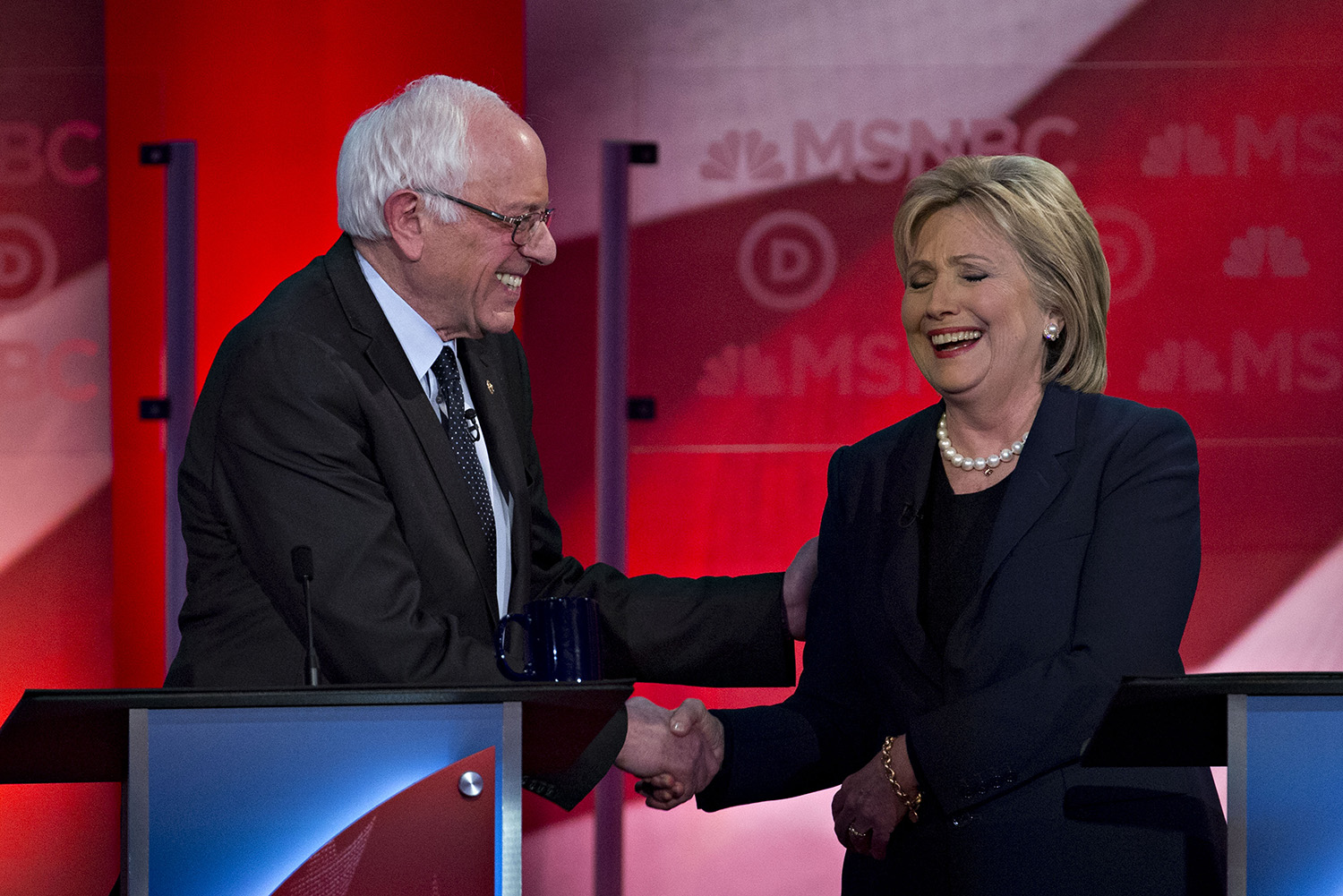
Neither of the Democratic presidential candidates, Hillary Clinton or Bernie Sanders, has suggested tax reform. (Bloomberg photo)
Two major, related questions are whether there is support among Democrats for tax reform, and whether Republicans could or would work with them to pass legislation.
Some prominent Democrats in the past have worked toward bipartisan tax reform, such as Oregon Sen. Ron Wyden, the top Democrat on the Finance Committee. Wyden was described as “a hero” by James Pinkerton, the Republican co-chairman of the RATE Coalition, a group of businesses advocating corporate tax reform.
Yet, there are signs that the days of Democrats taking interest in broad tax reforms such as the flat tax — as did former New Jersey Sen. Bill Bradley and California Gov. Jerry Brown during his first tenure in office — are long gone.
Neither of the Democratic presidential candidates, Hillary Clinton or Bernie Sanders, has suggested tax reform. Instead, they have proposed ways to raise revenue to fund ambitious new government programs using rate increases and new taxes within the existing code. Clinton would raise $1.1 trillion, and Sanders would raise $15.3 trillion, according to the nonprofit Tax Policy Center.
In other words, tax reform is not likely under a Democratic president. The question is whether a Republican president and House could get it done with a Republican Senate or a Democratic Senate.
Opinions differ. Norquist, a longtime partisan, thinks it’s on Republicans, with little or no Democratic help. Democrats simply don’t agree with Republicans, he said, and only pretend to agree because “they don’t want to get yelled at by their business donors.”
The Norquist scenario would be a GOP Congress passing tax reform, likely through reconciliation, the budget tool that makes it possible for the Senate to pass legislation with only 51 votes. President George W. Bush used the procedure to pass his tax cuts. Before bowing out of the race, Rubio suggested that he would pursue such a strategy.
Perhaps partly because of the mixed experience with the Bush tax cuts, however, others believe that it would be a mistake to reform the tax code on a partisan basis.
“I don’t think that works anymore,” Troy said. Instead, he argued, it is necessary “to have one of those big compromises, where at the end, everyone gets something.”
A strong motive: Inversions
The most Democratic support would be for corporate tax reform. The recent rush of companies seeking to leave the U.S., such as Burger King and Medtronic, has spooked members of Congress, including Democrats.
“Look at any senator or any congressman anywhere in the country and say, “Big Company X or Big Company Y is in this district or state, and what would it be like for incumbent Politician Z if they were to leave,'” Pinkerton said.
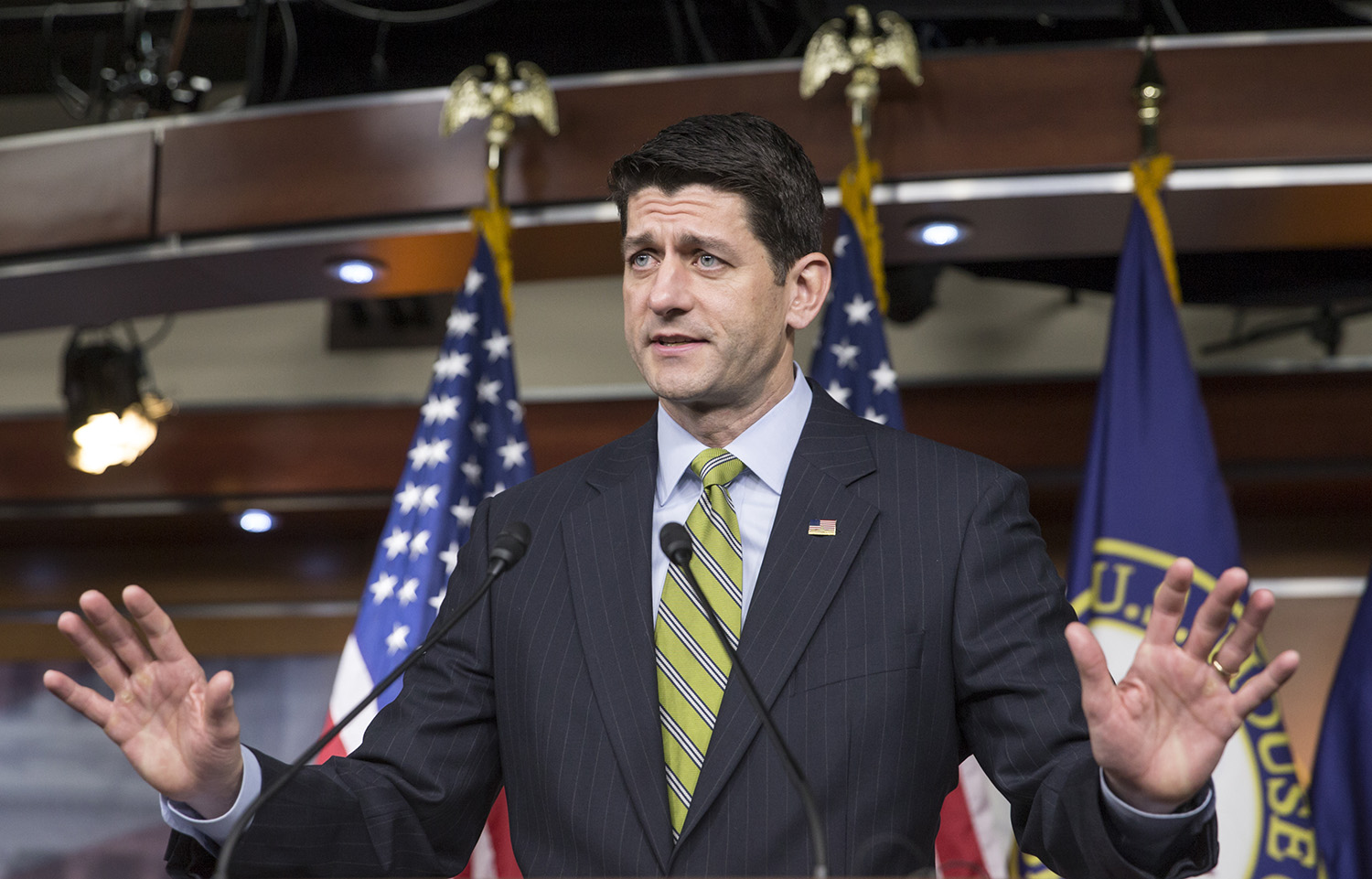
House Speaker Paul Ryan has justified pushing for international reform this year as a “down payment” on broader reform in 2017 and beyond. (AP Photo)
The logic of stopping such “inversions,” however, is tricky and not necessarily conducive to reform.
Companies “invert” by merging with smaller companies in low-tax nations and then moving the headquarters of the combined company.
Doing so is a big advantage for two reasons. First, because the U.S. is unusual in levying corporate taxes on worldwide income, inverting allows multinationals to avoid paying the 35 percent tax rate on the earnings of their foreign subsidiaries.
Second, inverting provides a way for companies to access the earnings they have left overseas to avoid U.S. taxation, without paying U.S. taxes on them. More than $2 trillion of such unrepatriated earnings is estimated to be parked overseas.
One way to alleviate the problem would be to simply end the odd practice of taxing companies on their worldwide income and allow them to bring back their current unrepatriated earnings at a lower rate.
Brady is backing legislation to do that, and top lawmakers such as Ryan, Sen. Chuck Schumer, D-N.Y., and Sen. Rob Portman, R-Ohio, are behind the effort. Ryan has justified pushing for international reform this year as a “down payment” on broader reform in 2017 and beyond.
But success might mean the end, rather than the beginning, of a larger tax reform effort. Corporate executives’ desire to unlock their foreign earnings is “a tremendous catalyst for tax reform,” said Martin Sullivan, chief economist for Tax Analysts. “And if you were to enact a tax reform that solved that problem, a lot of the energy, a lot of the motivation for doing general tax reform goes away.
By solving the problems of the multinational companies, Congress may lose momentum for overall reform.
Involving all kinds of businesses, however, isn’t necessarily easier. The current push for international tax reform took off only after the Obama White House and the GOP Congress failed to find common ground on a bigger deal to reform taxes for businesses.
The attempt faltered when the two sides couldn’t agree on how to handle the millions of businesses that file through the individual side of the tax code. “Pass-throughs,” as they are called, account for nearly two-thirds of business income and employ more than half the workers.
After a titanic showdown in the “fiscal cliff” of 2012 to reverse the Bush tax cuts for high earners, Obama could not countenance lowering individual tax rates, which would have solved the problem. Unable to find a fix, the business-only plan fell by the wayside.
That leaves the possibility of Congress overhauling the entire tax code, both individual and corporate.
There, however, Democrats may have simply moved too far left to participate.
In a speech to the New York Bar Association Tax Section in January, Obama economic adviser Jason Furman asserted that “fundamental tax reform is not necessary and may not even be sufficient.” The economic gains from lowering individual tax rates, he explained, would not be enough to convince lawmakers to cut the tax breaks they love so much. And Democrats, at least Obama, are not willing to implement a tax cut to grease the wheels of reform.
That’s where the situation stands: with Republicans in love with the idea of tax reform, Democrats disenchanted and businesses desperate.
